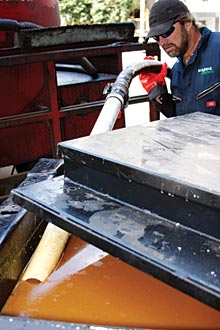Mitch Mechanic believes there’s only one failsafe way to gauge a restaurant’s quality: Check its waste oil.

“Don’t read the reviews,” the hyperkinetic Mechanic declares as he pokes a vacuum hose thick as an elephant’s trunk into a grease collection bin behind the Grove Arcade. “Look at their oil. A really good, conscientious restaurant will use expensive oil and change it more often.”
Quality choices like that make for fresh, tasty food, and—more importantly for Mechanic and the rest of the crew at Blue Ridge Biofuels— fryer oil that can easily be converted into high-grade fuel. Feedstock Manager Micah Nerenberg speaks about his raw ingredients with a chef’s reverence, only reluctantly shying away from words like “golden” to express his admiration for some restaurants’ waste products.
“We have five restaurants in Rat Alley that make absolutely beautiful stuff,” says Nerenberg, referring to a dark corridor that runs behind a downtown strip of restaurants. “That oil is superb.”
Mechanic pronounces the rich ochre sludge coagulating in the shared bin at Grove Arcade “good,” although he’s initially taken aback by the oil’s consistency.
“I’ve never seen it look like this before,” Mechanic says, surmising that a new eatery might have begun dumping its oil in the bin. “It’s OK, it’s just different.”
Some oil, Mechanic confides, is definitely not OK. There are local restaurants where no halfway-savvy oil maven would deign to eat, so polluted is their waste oil by soap and scraps. Still, Blue Ridge Biofuels is determined to overcome kitchen carelessness, restaurant-owners’ wariness and language barriers to make every restaurant from Asheville to Waynesville a contributor to its stockpile of used frying oils. Although more than 150 restaurants already contract with the company, the growing hunger for locally produced, sustainable biofuel must be fed, Nerenberg says.
“We’re able to produce, in a really good week, only about 50 percent of our demand,” Nerenberg says. “We estimate two million gallons of waste oil are produced in Western North Carolina every week, and we’re getting 2,000 gallons on a good week. This is the tip of the iceberg.”
Although studies have shown the production of certain biofuels silently assaults the earth by perpetuating deforestation, environmentalists are still chattering excitedly about the potential of sustainable alternatives like the recycled-waste-oil model on which Blue Ridge Biofuels relies. North Carolina, which imports every drop of its petroleum-based fuel, has been an enthusiastic supporter of such programs, funding new biodiesel plants across the state and upping its investment in flexible-fuel vehicles. According to political leaders, the systematic greening of the state could spell more jobs, cheaper fuel and a cleaner environment for North Carolinians.

But the success of biofuel recycling programs depends upon a steady supply of waste oil. Blue Ridge’s experience in this arena could be particularly instructive for similar initiatives statewide, since, when it comes to environmental-protection solutions, an Asheville try-out is the equivalent of an off-Broadway run. The local audience for all things green is enthusiastic and receptive, but if a program fails to resonate with them, it’s almost sure to flop elsewhere.
Nerenberg admits Blue Ridge has faced challenges in its quest to recycle enough waste oil to heat its customers’ homes and power their cars, but predicts more restaurants will soon partner with the company. Recent new accounts include the Asheville Mall and the Biltmore Estate, hardly the crunchy tempeh-and-tofu-type eateries that were the first to come on board.
“There’s such a drive to green restaurants now,” feedstock-acquisitions manager Jason Wise says. “A lot of restaurants want to help.”
When Blue Ridge launched operations in 2004, the few restaurant owners who bothered to entertain its pitch were unwaveringly skeptical about the concept. But a few hot summers and one Al Gore Nobel Prize later, “90 percent of restaurant owners know what biodiesel is,” Wise says.
“When we first started, you can imagine what people said about it,” Nerenberg says. “They used to be like ‘OK, crazy man, go on your way.’”
Penetrating restaurateurs’ consciousnesses may have been the easy part. Nerenberg says his efforts to sell restaurant owners on Blue Ridge’s services have been complicated by a more enduring problem: Folks in the food-and-beverage business are busy. Too busy, often, to reconsider something as seemingly mundane as oil disposal.
“They have someone collecting their oil right now, so why mess with it?” Nerenberg says, parroting the response he’s received from so many restaurant owners.
Blue Ridge is doing its best to counter the lackadaisical argument by offering to keep their restaurants’ bins clean, maintaining a flexible route schedule and promising a nickel more per gallon than most conventional oil collectors, who funnel waste to animal-feed and cosmetics factories, can muster. Blue Ridge typically pays 30 cents for one gallon of waste oil that, after a heating, filtering and reheating process, will produce one gallon of useable biofuel.
But realizing incentives alone won’t cause most harried restaurant owners to complete the paperwork needed to make the switch, Blue Ridge also devotes a tremendous amount of staff time to personally lobbying restaurant owners.
“We were knocking on the door at Mack Kells for six months,” Nerenberg recalls. The turning point was when the kitchen manager saw a segment about one of Blue Ridge’s stations on the local news. “He called us up, and now they’re producing wonderful oil for us.”
Blue Ridge has lately been focusing its recruitment efforts on the many restaurant owners whose first language isn’t English. They’ve found a Spanish speaker to serve as their ambassador to the area’s many Latin American eateries, but are still working on a way to claim the remarkably clean oil emerging from Chinese-restaurant kitchens.
“If you know anyone who knows Mandarin, let us know,” Nerenberg says wistfully.



Before you comment
The comments section is here to provide a platform for civil dialogue on the issues we face together as a local community. Xpress is committed to offering this platform for all voices, but when the tone of the discussion gets nasty or strays off topic, we believe many people choose not to participate. Xpress editors are determined to moderate comments to ensure a constructive interchange is maintained. All comments judged not to be in keeping with the spirit of civil discourse will be removed and repeat violators will be banned. See here for our terms of service. Thank you for being part of this effort to promote respectful discussion.